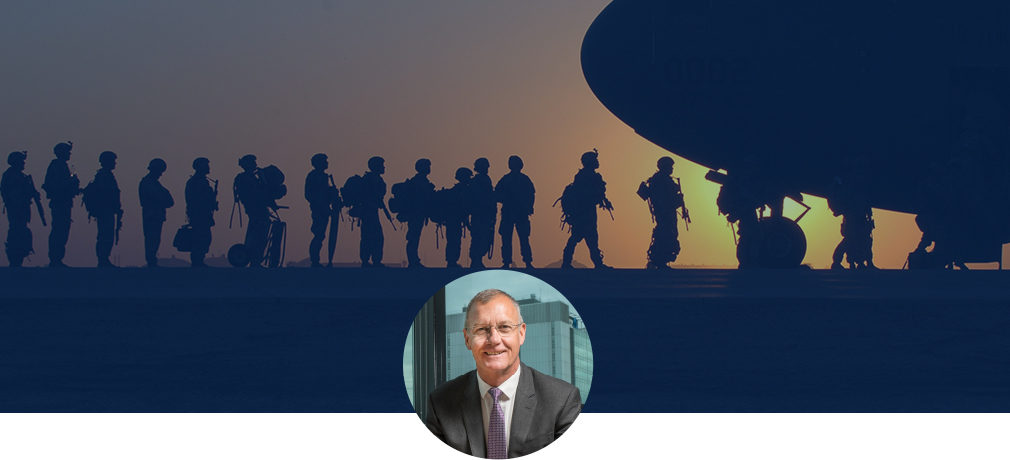David Ruff
Chief Executive Officer Australasia
The views reflected in this article are the views of the author and do not necessarily reflect the views of Babcock International Group or those affiliated with it.
Recent press coverage has highlighted the value that defence veterans can bring to companies and corporate culture. For those individuals and organisations that are not familiar with the defence sector, it’s easy to imagine the directive world of military leadership has little to teach the C-suite. But, as one of those who has benefitted from both defence and commercial sectors, I believe there is a substantial amount of common ground between corporate and military leaders.
Differences in the military directive
First, let’s be clear about what’s different in the military experience. The biggest differentiator is the bond of ‘sacrifice’: the military covenant of society acknowledging that defence people are prepared to pay the ultimate price to defend their mates, and their country. There is no real corporate equivalent of this compact. Its existence creates a culture that is almost impossible to replicate in non-military teams. And it is why the military places so much time, effort and expense on training, operational preparation and leadership.
Second, let’s examine the combined notions of trust, respect and moral courage. I have had the extremely good fortune of seeing these through the very different lenses of being a soldier (the “led”) and an officer (the “leader”):
As a soldier – you are part of the chaos of war. Battle can be terrifying and never goes to plan. Succeeding in this maelstrom relies on the chain of command. So basic training centres on fostering discipline, efficiency and loyalty, creating people who obey orders and have the physical courage to execute a task even when in fear of their lives. This environment instils a very high degree of reliance on a leader; and it follows that soldiers have to “grant” trust to their officers, to know and do what is best for the team. However, officers also have to earn the trust of their team; if they don’t, then the “granted” trust is soon eroded – and, with it, any respect that might have accrued. Without trust and respect, the very cohesion of the team is threatened.
As an officer – you have to lead your team through the chaos, to manage failure and success at the same pace – and often at the same time. Your job is to succeed, to make the critical decisions that achieve the objective. At the same time, you have to look after your team in every regard – from managing their fear to making sure they get enough rest and enough to eat. (The leader always eats last!) Achieving the right balance between doing whatever it takes to succeed, and looking after your team’s individual and collective needs, both physical and spiritual, takes a high degree of moral courage. This itself demands high levels of emotional intelligence, compassion and creativity – qualities not popularly associated with military leadership – as well as intellect, judgement and integrity.
Clearly, the soldier/officer dynamic is very different from the corporate context, where we have a more consensual model of leadership; where people are actively encouraged to question the status quo; where a CEO cannot merely decree orders and expect them to be obeyed. We actually have to get people to do things willingly, to agree that they should give their best, to perform at consistently high levels in the corporate interest. In this latter regard, there is a distinct parallel between military and corporate leadership.
I remember the experience of my first corporate meeting, fresh out of the military, when everyone at the table not only had strong views on the strategy I was proposing, but actively expressed them. Rank was irrelevant and what really mattered was the substance of the discussion. What was even more compelling was that we walked out of that meeting with a better strategy than the one I’d proposed.
Lesson learnt!
Similarities essential for all leaders
Yet, despite the differences between the military’s more directive style of leadership, and the consensual model of the corporate world, several qualities are key to both:
Self-awareness – The idea that military leaders don’t have high emotional intelligence is a complete myth; in fact, the leaders I have met with the highest EI have been in the military. When a soldier is killed in battle, the officer’s job is to get those who remain quickly over it and back on mission. It’s bloody hard – and it takes empathy and strength in equal measures. And then when you get home, there’s your mate’s family to care about – as long as you appreciate your roles and responsibilities in the greater cause, you never lose that bond.
I thought there would be no corporate equivalent of that moment. But, in business, leadership decisions still affect lives. Laying people off can have terrible consequences, especially for families. Personally, I find dealing with the pain of redundancies, to the individuals involved and those left behind, as hard as anything I had to face in the military.
But, of course, self-awareness isn’t just needed in extreme situations. As leaders, we need to be aware of our personal impact on others at all times. I try to think and act two up and two down. The test of my impact on my direct reports is how they treat theirs. The test of my impact on my boss, the Group CEO, is what the Board thinks of Babcock Australasia.
Courageous – Physical courage is an emotional state which enables a person to risk injury or death; charging into withering gunfire is an emotional (some might say irrational) response to seeing your mates getting shot. We rarely need that type of physical courage in business; but we need moral courage all the time. This is the “reasoning attitude” that enables us to put our jobs – even our careers – at stake based on what we believe is right.
At Babcock Australia, we faced such a moment when we took on ground support equipment maintenance for Qantas. In the UK, Babcock was already doing this job for British Airways, so the expectation was that we would simply deploy the UK model. But Qantas wanted a fundamentally different system. It took great courage for my team to say “No” to a head office that, at one point, specifically forbade us from developing a different system. I’m proud that we have people who had the moral courage to put our Qantas customer first, to reject the corporate direction and who developed a solution that, today, the UK holds up as an exemplar!
Earning trust – As I’ve already said, the concept of trust in the military extends both to ‘granted’ trust (because of rank) and ‘earned’ trust (by deed and example). This is something I learnt very early on. Having been fortunate enough to win the Sword of Honour at Sandhurst, I arrived at my first posting (with the Royal Marines) to discover the base plastered with photographs of the Queen presenting me with my award. The photo was annotated with the challenge: “Yes, but can he be a Commando?” and it brought me crashing down to earth. While the Marines would salute me because of my rank, it was clear that I had to earn their trust (by proving that I could live up to their extremely high standards and code), or I would never be an effective leader in that organisation.
Which is why I believe every corporate leader needs to earn trust; it is simply not good enough to expect people to trust you just because of the rank on your shoulder, or the title on the desk. CEO’s, like military officers, must “Serve to Lead” – the motto of the Royal Military Academy, Sandhurst – which, in the corporate context, means that CEOs need to lead by the force of their unselfish example. They must earn trust, by always putting the needs of the team above their own – always ‘eating last’. They must –share the credit when things go well; and, of course, take the blame when they don’t.
Inspiring – Corporate and military leaders must inspire their teams. While this implies creativity, energy and drive, the real foundation of it is walking the talk; by being exemplars of the standards they set, the behaviours they expect and the culture they strive for. It’s about demonstrating: selflessness, energy, determination, cheerfulness, hard work, commitment, humility and integrity. Successful leaders – military and corporate alike – unify people around a purpose. They speak with the authority of conviction, and their words are matched by their actions. The confluence of self-awareness, courage and earned trust that forms the inspirational leader, the real deal.
Field Marshall Bill Slim, the leader of the WW2 Burma campaign, famously said, “… Leadership is of the spirit, compounded of personality and vision, its practice is an art.”
I think that’s as true today as it ever has been.

